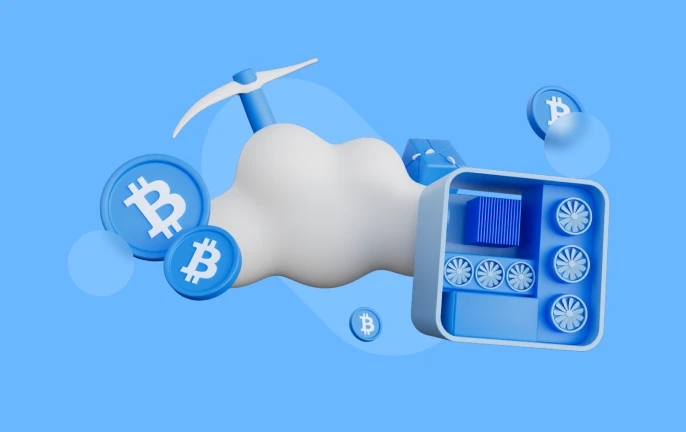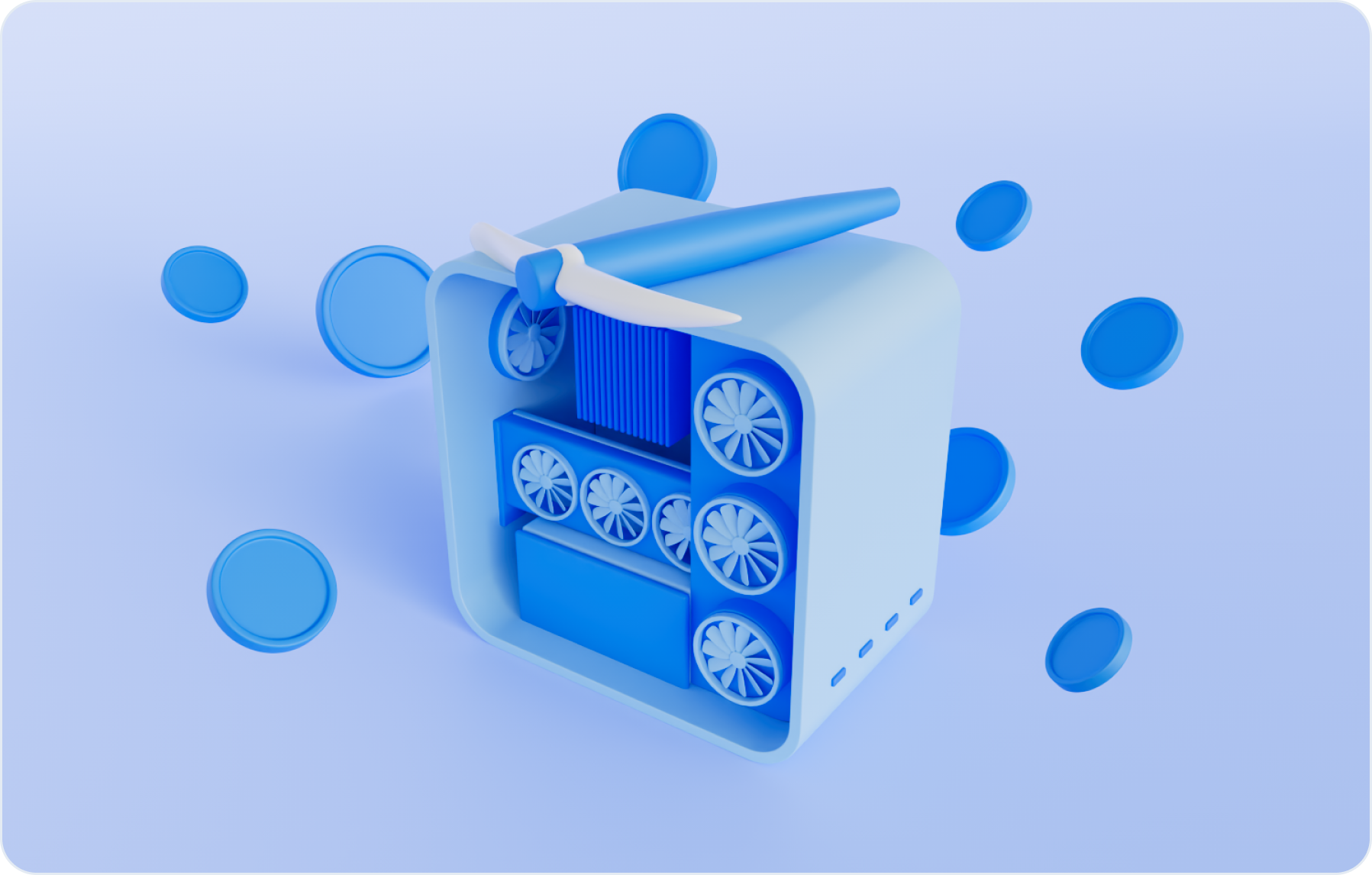How Does Mining Work: Mining Tools Explained

Key Insights
- Traditional mining demands specialized equipment adapting to increasing difficulty and costs, but allows independence and maximizing profits.
- Cloud mining eliminates acquiring and maintaining hardware, enabling beginners to start off easier, but has risks data security.
- Pool mining enables collaboration between miners to increase success rates and get steady payouts, balancing teamwork and individual contribution.
What Is Mining
For cryptocurrencies that use the Proof-of-Work (PoW) consensus mechanism, miners must confirm that they have used computational power in the mining process before the network reaches a consensus and adds a new block of transactions.
Miners are rewarded by the network for providing the Proof-of-Work by submitting hashes that prove computational resources were used.
How to Mine Bitcoin?
Miners who solve the equation to find the correct hash before a new block of transactions is added to the network are rewarded with freshly-minted BTC and transaction fees paid by Bitcoin users.
The process continues until another miner discovers the next correct hash, allowing the new block to be added. That’s how mining crypto works.
You can also get BTC on SimpleSwap for crypto or fiat.
Traditional Mining
Traditional mining constitutes a fundamental method of crypto extraction, demanding profound knowledge, technical expertise, and readiness to adapt to evolving market conditions.

- Equipment and Coin Selection
The initial phase of traditional mining involves a deliberate selection of equipment. Miners face the decision of employing specialized ASIC miners for specific algorithms or versatile GPUs (Graphics processing units) capable of mining diverse cryptocurrencies. This choice significantly impacts future mining efficiency.
- Difficulty and Costs
Mining difficulty dynamically shifts according to the network's overall computational power. As complexity grows,increased computational resources are requisite for identifying the correct hash, affecting profitability. Miners must account for initial investments in equipment and operational expenditures.
- Independence and Control
Traditional mining grants miners full control. They opt for the crypto, algorithms, and timing for selling. This confers freedom of action and the possibility of achieving maximal profitability. Nonetheless, this control mandates profound market and technological comprehension, along with constant situational monitoring.
- Adaptation and Optimization
Adaptation is an indispensable component of success within the realm of traditional mining. With escalating mining complexity and shifts in market conditions, miners must be prepared to reassess their strategies. This encompasses choosing more advantageous coins or algorithms, as well as potentially augmenting equipment power.
Cloud Mining
Cloud mining is an innovative method of crypto extraction that offers convenience and flexibility without the need for owning physical equipment.
Cloud mining entails miners collaborating with remote servers. Instead of purchasing and maintaining hardware, miners rent computational power from specialized platforms and crypto mining software.

Platforms like NiceHash and Genesis Mining act as intermediaries between miners and users seeking computational power. Miners can lease their resources for mining, ensuring simplicity and transparency for both parties.
Advantages of Cloud Mining
- Convenience and Time Savings
Cloud mining eliminates the need to acquire, set up, and maintain physical equipment. This allows a focus on the mining process itself.
- Beginner-Friendliness
Cloud mining is ideal for those embarking on their cryptocurrency journey. The absence of technical knowledge requirements enables quicker entry into the process.
- Flexibility and Variety
Miners can rent computational power for different coins and algorithms based on current profitability. This ensures greater flexibility during and after mining and the ability to swiftly respond to market changes.
Risks of Cloud Mining
- Equipment Control
Cloud mining deprives miners of full control over physical hardware. Platforms manage this aspect, making it crucial for miners to carefully select reliable and proven partners.
- Network Security Risks
Potential mining risks related to network security should also be considered. Miners must ensure robust protection of their data and accounts.
Cloud mining offers convenience and accessibility while limiting miners' control over the process. It strikes a balance between convenience and risk readiness. Choosing reputable platforms and approaching resource management thoughtfully is essential.
Mining Pools
Mining in pools is a method that combines the efforts of miners for collective crypto extraction. This approach increases the likelihood of discovering new blocks and ensures stability in receiving rewards.

- Collaboration and Cooperative Work
Pool mining is based on the idea of collaboration. Miners pool their resources and computational power for joint cryptocurrency mining. This method enhances the probability of successfully finding blocks.
- Steady Payouts
One of the key advantages of pool mining is the stability of payouts. Even with modest individual computational power, miners regularly receive their share of rewards, providing a more stable income.
- Reward Distribution
In pools, rewards for successfully found blocks are distributed fairly among mining participants based on their contribution to the total computational power. This helps balance the power disparity among participants, making the process more equitable.
Harmony Between Collaboration and Independence
- Collective Interaction
Pool mining demonstrates the strength of collective interaction. Miners come together to increase their chances of successful mining while reducing income variability.
- Individual Contribution
Despite combining efforts, miners can maintain a degree of independence. Their individual contribution to the collective mining power determines their share of the reward.
Pool Selection
Mining participants should carefully choose the pool with which they will collaborate. The pool's reputation, fees, reward distribution method, and other factors can significantly influence mining outcomes.
Summary
In this article we explain what is crypto mining and how does crypto mining works. For instance, Bitcoin mining and that of several other cryptocurrencies.
Mining has long evolved into a complex and diverse process. Each of mining tools we’ve explored offers unique advantages and challenges, and your choice will depend on your goals, budget, and level of technical experience.
Traditional mining demands deep knowledge and skills but provides complete control and independence. It is suitable for those willing to invest significant resources, time, and effort into optimizing and adapting their mining strategy.
Cloud mining brings convenience to beginners and those who wish to avoid the concerns of physical equipment. It is important to approach it cautiously, choosing reliable platforms and considering potential risks.
Pool mining ensures collective participation and steady payouts, even for miners with limited power. Collaborating with pools strikes a balance between teamwork and individual contribution.
The information in this article is not a piece of financial advice or any other advice of any kind. The reader should be aware of the risks involved in trading cryptocurrencies and make their own informed decisions. SimpleSwap is not responsible for any losses incurred due to such risks. For details, please see our Terms of Service.


